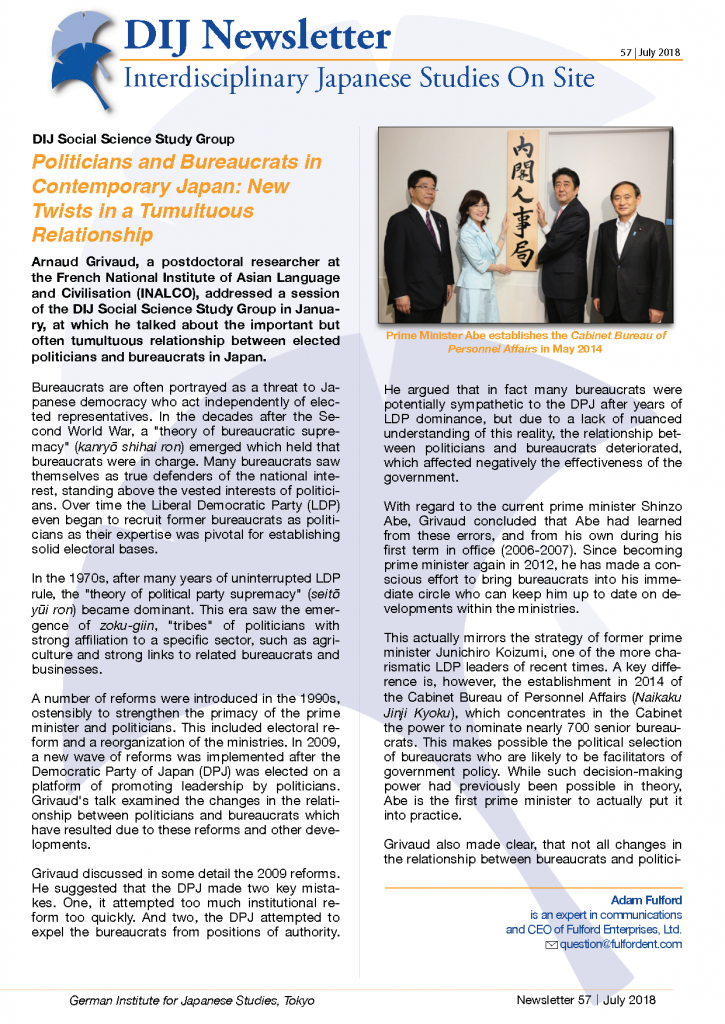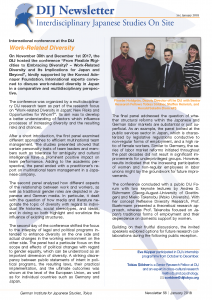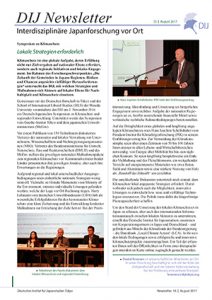Events and Activities
The Politics of Balancing Flexibility and Equality: A Comparison of Recent Equal Pay Reforms in Germany and Japan
In Germany and Japan, like in most OECD countries, the equal pay for equal work principle and other regulations related to equal treatment have been strengthened recently through reforms. These have been justified and promoted as measures to address gender wage gaps as well as discriminatory practices regarding non-standard workers. Yet, observers remain sceptical as to whether these reforms will be effective. Previous research has argued that Germany and Japan as “socially conservative welfare states” (Gottfried and O’Reilly 2002) face particular institutional and value-related obstacles for achieving equal treatment in practice. This paper argues that, while these factors remain important, gaps between policy output and persisting inequalities are increasingly the result of a strategically motivated politics of balancing. Policymakers in both countries use existing institutions such as collective bargaining and labour-management consultations to balance conflicting policy goals, i.e. improving equal treatment and maintaining employment flexibility, which crucially relies on differentiated treatment of workers by, for example, distinguishing between standard and non-standard workers. By resorting to strategies of balancing policymakers hope to console both objectives while mitigating the political risks of controversial structural reform.
DIJ Newsletter 57 is out now!
 DIJ Newsletter 57 is out now! This issue features the following topics:
DIJ Newsletter 57 is out now! This issue features the following topics:
DIJ Social Science Study Group: Politicians and Bureaucrats in Contemporary Japan: New Twists in a Tumultuous Relationship
Arnaud Grivaud, a postdoctoral researcher at the French National Institute of Asian Language and Civilisation (INALCO), addressed a session of the DIJ Social Science Study Group in January, at which he talked about the important but often tumultuous relationship between elected politicians and bureaucrats in Japan.
China, Japan, and the Contest for ‘Asia’
China’s recent rediscovery of the Silk Road reaffirms the country’s claim to being acknowledged once again in its role as the ‘Central Kingdom’. Its ambition is global but at its core is China’s position in Asia.
(Re)Locating the Tsukiji Central Wholesale Market
Located in the heart of Tokyo, the Tsukiji Wholesale Market is the world’s largest seafood market with annual sales of 428 billion yen in 2017. It is most famous for its tuna auctions setting the world market prices, but in addition to seafood, there is also trade in vegetables, fruit, eggs, chicken and processed foods. The market was founded in the Edo period and stands in its present location since 1935. After decades of political contestation, it is now scheduled to relocate to a modern construction in Toyosu in October.
Inbound Tourism – Japan’s new growth market
Since 2012, Japan has been experiencing a veritable tourist boom. More than 28 million residents from abroad visited the country in 2017, four times as many as in 2011.
DIJ-Monographie 61 erschienen!
“Networks and Mobilization Processes: The Case of the Japanese Anti-Nuclear Movement after Fukushima”
Environmental disasters or other large-scale disruptive events often trigger the emergence of social movements demanding social and/or political change. This study investigates mobilization processes at the meso level of the Japanese anti-nuclear movement after the nuclear disaster at the Fukushima Daiichi nuclear power plant caused by the Great East Japan Earthquake and subsequent tsunami waves on March 11, 2011. To capture such meso level movement dynamics – which so far have played only a minor role in research on social movement mobilization – the study presents an analytical model based on premises from political process theory, network theory, and relational sociology. This model is then applied to the case of the Japanese anti-nuclear movement after Fukushima by looking at the relational dynamics of two coalitional movement networks engaged in advocacy-related activities in Tōkyō.
DIJ Newsletter 56 is out now!

This issue features the following topics:
International conference at the DIJ: Work-Related Diversity
On November 30th and December 1st 2017, the DIJ hosted the conference “From Flexible Rigidities to Embracing Diversity? – Work-Related Diversity and Its Implications for Japan and Beyond”
Local Anti-Nuclear Movements in Japan
The construction of a nuclear power plant is always a fiercely contested issue, especially for the affected local communities.
Japan’s rural areas – challenges and policies
Many municipalities outside of Japan’s larger agglomeration are exposed to severe demographic change.
Do labour market inequalities erode support for democracy?
In October 2017, a workshop examined links between labour market inequalities and politics in France, Germany and Japan.
Non-Japanese employees in Japan
Since the global financial crisis the number of Non-Japanese employees working in Japan is rising again.
The DIJ Newsletter is available in German and English, for download and in print.
“Rural Japan Revisited” – Contemporary Japan Virtual Special Issue

This virtual special issue is dedicated to contemporary studies exploring a Japan beyond the country’s metropolitan areas. Over the past decades, rural Japan nearly vanished from the Western research agenda, as urban Japan had come to dominate the attention of most social scientists studying contemporary Japan. Particularly the cityscape of Tokyo, the epitome of the Asian mega-city, has shaped the popular cultural imagination of Japan from abroad to an extent that the countryside, if seen at all, acquires all qualities of a museum or cultural repository of the past. Yet it should not be forgotten that millions of Japanese continue to live in quite different social spaces, such as hamlets, villages, or rural towns in mountainous and coastal areas. Even though urbanization, consumption and media usage have left their imprint on everyday life, social values and behavior rules in even the most remote part of the country, there is ample reason to take the urban-rural divide as a meaningful line of distinction between the two structurally different and inherently distinct spheres of city and countryside.
This virtual special issue has been compiled as a reminder of the significance that life and living in regional Japan is having for an adequate understanding of contemporary Japan, the changing faces of the “rural imaginary” (Schnell 2005) and the plurality of lifeways in late-modern society.
Management Careers, Internal Control and Corporate Governance. Where Japan and Germany Differ

Career concerns of managers function as an important control mechanism in the context of corporate governance. They bear important motivating and disciplining effects. In Japan, where – in the absence of a well-functioning external market – management careers have been generally restricted to in-house promotions, career concerns also result in efforts by middle management to exert control over and influence top management decisions as they impact their career perspectives.
Takaaki Eguchi’s paper explains the background and implications of such internal control mechanisms in Japan and points to their limitations in recent years given the increasing need for a stronger top management function. Reviewing relevant empirical research, Franz Waldenberger shows that managerial careers in Germany have long been embedded in an external market.
DIJ Newsletter No. 55 is out now!

The current issue features a comprehensive report about the German-Japanese Symposium on climate change mitigation and regional development („Deutsch-Japanisches Symposium zu Klimaschutz und regionaler Entwicklung“) which was hosted in cooperation with the Embassy of Germany in Tokyo and the School of International Liberal Studies (SILS) at Waseda University.
In addition to that we also report on some of DIJ’s other events from the recent past, present our latest publications and introduce one of our new employees.
As always, the DIJ Newsletter is available as PDF file and in print.
“Japan in der Ära Abe. Eine politikwissenschaftliche Analyse” – DIJ Monographie 60 erschienen!

Wie kaum ein japanischer Premierminister vor ihm scheint der seit 2012 wieder amtierende Shinzō Abe die Politik seines Landes grundlegend zu verändern. Als Spross einer Politikerdynastie eigentlich ein typischer Vertreter des politischen Establishments, verspricht er in allen zentralen Politikfeldern – von der Außen- und Sicherheitspolitik, über die Wirtschafts- und Arbeitsmarktpolitik, bis hin zur Energiepolitik –, alte Gewissheiten und Strukturen in Frage zu stellen. Dazu kommt, dass es Abe gelungen ist, im notorisch instabilen Regierungssystem Japans eine ungewöhnlich populäre und scheinbar fest im Sattel sitzende Regierung zu formen. Doch gleichzeitig regt sich Widerstand vor allem bei der japanischen Jugend, die mit Großdemonstrationen und neuen Formen des Protests auf sich aufmerksam macht.
Die in diesem Band versammelten Beiträge beleuchten diese und weitere Trends der Ära Abe.





 Open Access
Open Access
